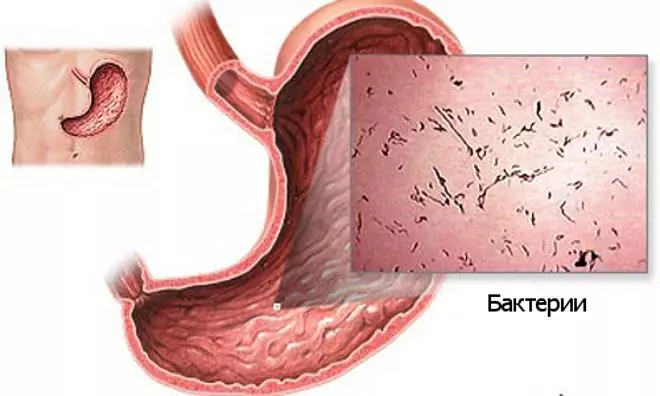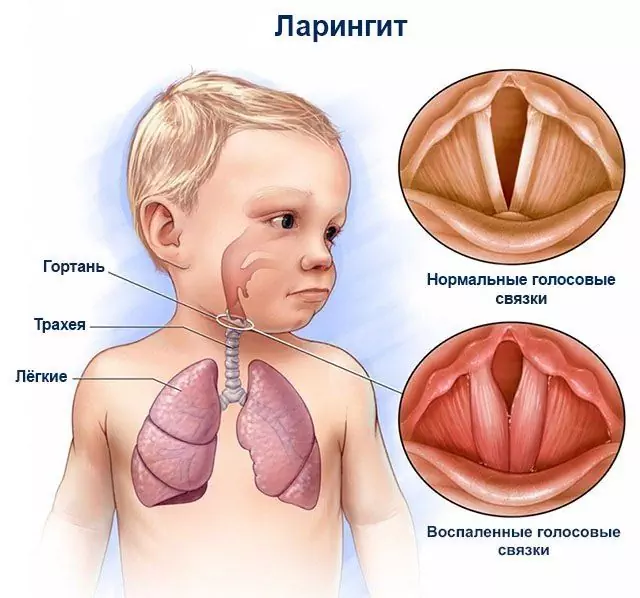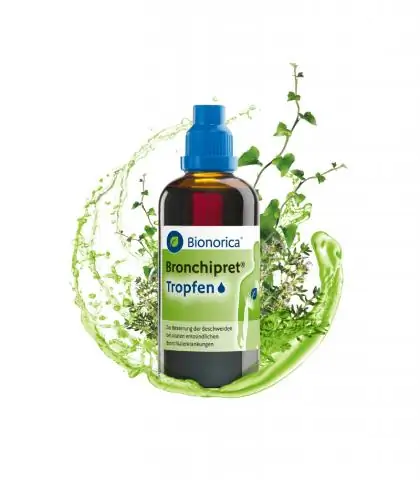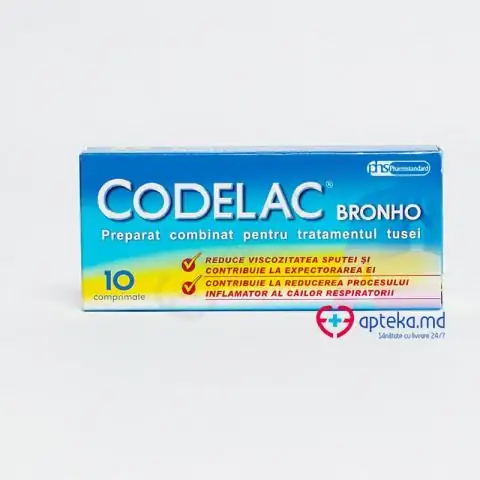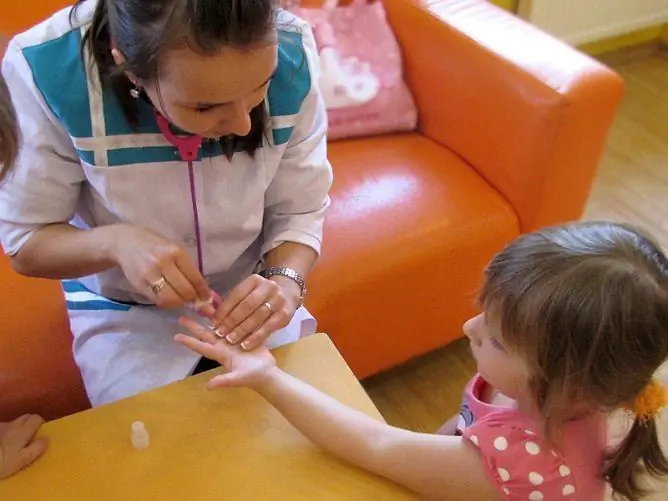- Author Rachel Wainwright wainwright@abchealthonline.com.
- Public 2023-12-15 07:39.
- Last modified 2025-11-02 20:14.
Vocard
Vokara: instructions for use and reviews
- 1. Release form and composition
- 2. Pharmacological properties
- 3. Indications for use
- 4. Contraindications
- 5. Method of application and dosage
- 6. Side effects
- 7. Overdose
- 8. Special instructions
- 9. Application during pregnancy and lactation
- 10. Use in childhood
- 11. Drug interactions
- 12. Analogs
- 13. Terms and conditions of storage
- 14. Terms of dispensing from pharmacies
- 15. Reviews
- 16. Price in pharmacies
Latin name: Vocara
ATX code: R05X
Active ingredient: sage (Salvia) + belladonna (Belladonna) + lakonos (Phytolacca) + poison of the Surukuku snake (Lachesis) + soluble mercury according to Hahnemann (Mercurius solubilis Hahnemanni)
Producer: Richard Bittner AG (Austria)
Description and photo update: 2019-19-08

Vocara is a complex homeopathic medicine used in the treatment of pharyngitis, tonsillitis, chronic tonsillitis and a number of other diseases.
Release form and composition
Vokara is released in the form of homeopathic drops - a transparent, yellowish liquid with a specific odor (20, 50 or 100 ml each in dark glass dropper bottles, 1 bottle in a cardboard box).
The composition of 100 ml of the drug contains active substances:
- Belladonna D6 - 10 ml;
- Sage (Salvia) D1 - 7 ml;
- Snake venom Surukuku (Lachesis) D12 - 10 ml;
- Lakonos (Phytolacca) D6 - 10 ml;
- Mercurius solubilis according to Hahnemann (Mercurius solubilis Hahnemanni) D12 - 10 ml.
Auxiliary component: ethyl alcohol - 43% (by weight).
Pharmacological properties
Vocara is a complex homeopathic preparation, the action of which is due to the properties of its active ingredients. It has anti-inflammatory, detoxification, antimicrobial and immunostimulating effects.
Vocara is a mixture of various existing individual homeopathic remedies. In combination, they complement each other's effects and have a unidirectional effect.
Component properties:
- officinalis sage: contains natural antioxidants, organic acids, alkaloids, vitamins, essential oils, phytoncides, flavonoids, tannins and resinous substances; has a pronounced anti-inflammatory, antimicrobial, restorative effect;
- belladonna ordinary: contains alkaloids (mainly hyoscyamine and atropine); has an organotropic effect; its use is indicated in the treatment of inflammatory diseases of the respiratory and oral cavity;
- American laconos: the roots contain sucrose, starch, saponins, triterpenoids, phytolaccin, steroids, oxidase, phytolaccic and formic acids, essential and fatty oils; has an analgesic, anti-inflammatory, general immunostimulating, bacteriostatic, wound healing effect, improves metabolism;
- Surukuku snake venom: contains enzymes, peptides and various proteins, of which the hemagglutinin and hemolysin proteins are considered the most important; indicated for inflammatory processes in combination with bleeding of the mucous membranes;
- Hahnemann's soluble mercury: it blocks the sulfhydryl groups of the microbial cell, which explains its therapeutic effect.
Vokara helps to eliminate the manifestations of intoxication caused by the infectious process - chills, increased body temperature, microcirculation disorders and peripheral vasospasm, a feeling of weakness in the body, asthenia, muscle pain.
Other effects of using Vokara (depending on indications):
- angina, scarlet fever, chronic tonsillitis: the action of the drug is aimed at stopping the symptoms of the disease. Prevents the occurrence of exacerbations and chronicity of the inflammatory process. It helps to reduce hyperemia and edema of the palatine tonsils, eliminate the focus of chronic intoxication, accelerate the cleansing of the surface and lacunae of the tonsils from purulent contents and plaque, reduce the risk of developing purulent-necrotic complications; with scarlet fever, it relieves the accompanying symptoms, including immunopathological - lymphadenopathy, myocarditis, capillarotoxicosis;
- diseases of the ENT organs and oropharynx: helps to eliminate lymphadenitis and regional lymphadenopathy (immunomodulatory effect);
- stomatitis, gingivitis: helps to reduce hyperemia and edema of the oral mucosa, pain syndrome, accelerate the healing of aphthous lesions of the mucous membranes;
- pharyngitis, laryngitis, tracheitis: reduces the severity of inflammation, obsessive cough and sore throat, facilitates breathing, reduces the symptoms of laryngospasm, helps to restore the function and structure of the mucous membrane.
Indications for use
According to the instructions, Vokara is prescribed as part of the complex therapy of such diseases: chronic tonsillitis, tonsillitis, pharyngitis, lymphadenitis, gingivitis, stomatitis.
Contraindications
Contraindication to the use of Vokara is hypersensitivity to its components.
Nursing and pregnant women should take the drug with caution (as prescribed by a doctor).
Due to the lack of data on the safety and effectiveness of the application, Vokara is not prescribed for children under the age of 1 year. Children from 1 to 6 years old use the drug only on the recommendation of a pediatrician.
Instructions for use of Vokara: method and dosage
Vokara is taken orally by holding the drops in the mouth for 20-30 seconds before swallowing. The drug should be taken half an hour before or one hour after a meal.
Children from 1 to 4 years old are prescribed 1-4 drops of the drug, previously diluted in 1 tablespoon of water.
Children from 5 to 12 years old are prescribed 5-7 drops of the drug, previously diluted in 1 tablespoon of water.
Children from 12 years old and adults are usually prescribed 10 drops (drops are used in pure form or diluted in 1 tablespoon of water).
Frequency rate of application - 3 times a day. The duration of the treatment course is 14-28 days. If necessary, after consulting a doctor, the course can be repeated after a month.
In cases where a quick relief of the symptoms of the disease is required, before the onset of improvement in the condition, it is possible to take Vokara every 30-60 minutes, but no more than 8 times a day. After improvement, the drug is taken 3 times a day.
Side effects
In rare cases, when using Vocard drops, the development of increased salivation is possible.
Overdose
There is no information.
special instructions
In the event of side effects not described in the instructions, it is recommended to consult a doctor.
The preparation contains natural plant components, therefore, during storage, a weakening of smell, taste and a slight turbidity of the solution may be observed, which does not lead to a decrease in the effectiveness of the preparation.
Application during pregnancy and lactation
Vocard drops for pregnant and lactating women are prescribed with caution.
Pediatric use
Vokara is contraindicated for children under 1 year old. Children from 1 to 6 years old use the drug only on the recommendation of a pediatrician.
Drug interactions
There is no information on interactions with other medicinal products.
Analogs
Vokara's analogs are: Bronchicum, Doctor IOM, Septolete D, Tonsilgon N.
Terms and conditions of storage
Store in a protected from light and strong electromagnetic fields, out of reach of children, at temperatures up to 25 ° C.
The shelf life is 5 years.
Terms of dispensing from pharmacies
Available without a prescription.
Reviews about Vocar
According to reviews, Vokara effectively treats diseases of the ENT organs and oropharynx. It is noted that the drug has a quick action, is suitable for the treatment of adults and children from 1 year old and has good tolerance. Some users claim that the drops do not have the claimed therapeutic effect. The main disadvantages include the high cost and the presence of alcohol in the composition.
Price for Vokara in pharmacies
The price of Vokara is unknown, since the drug is not available in pharmacies.
Approximate price for analogs: Tonsilgon N (1 bottle of 100 ml) - 327-410 rubles, Septolete D (30 lozenges for resorption) - 180-259 rubles.

Maria Kulkes Medical journalist About the author
Education: First Moscow State Medical University named after I. M. Sechenov, specialty "General Medicine".
Information about the drug is generalized, provided for informational purposes only and does not replace the official instructions. Self-medication is hazardous to health!


